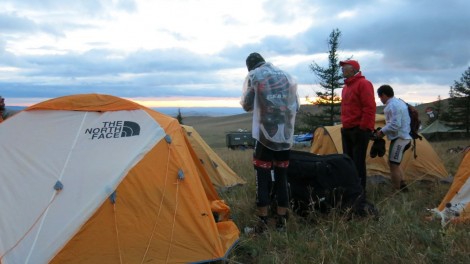Part of the joy of stage racing is the focus it gives you each day. Compared to the environment you’re stepping away from, life becomes highly simplified. You eat, race, eat and sleep. Sometimes there’s more eating. So although I know that I like to plan – to know, to prepare – and to an extent, control, at a point you need to give your time and self over to the machine that is a stage race.
The Mongolia Bike Challenge has thrown up many challenges so far. Stage 1 was hard, with countless sets of fresh legs testing each other. Some came up better than others. I was surprised to find myself 7th on the first stage, yet the gaps ahead were big. Stage 2 provided some regular stage race challenges, namely with nature making a 000 (911 for Americans) call at the first feed zone. Normally this wouldn’t be bad timing, except feedzones have become the favourite moment for the Spaniards to attack.
“That lacks class, it ignores race ettiquete. No favours for them anymore,” a leading rider was overheard to say after the stage.
Knowing how a group will behave in and out of a feed zone is essential for planning your race and tactics – so this move by the Spaniards was the first show of control slipping at the MBC.
Stage 3 was billed to be 147km, and the day dawned cold, and damp. With about 2-3cm of rain overnight, the boggy marshland we would be riding through would be challenging. Two of the Australians who work in Mongolia pre-rode the stages earlier this year. Even before a month of rain, they struggled to get their support vehicle across one of the main rivers. As we hit the bogs, race vehicles were stuck in mud, riders waded through waist deep freezing torrents, and by 40km the masseur Jordie was on the track, telling us the race finished here.
Racers shivered, sought shelter in vehicles or animal shelters, and many pulled out their space blankets from their compulsory emergency kit. It was less than 10º c and I was wet. I was quickly fairly useless, and had to ask Matt Page to keep an eye on me. Historically those sorts of conditions don’t treat me well. Control continued to slip.
After much radio discussion in a variety of languages, we were sent back through a river, up a long hill and back through the marshland to a gehr village. As is customary, we were welcomed in. And soon enough close to 100 mountain bikers were sheltered in a number of gehrs, with wet clothing being stripped off as the stoves warmed bodies and stole oxygen. We discussed potential plans, as it seemed like none were coming from the race.
At about 3pm, Daniella, the Race Referee, announced the plan with Willy Mulonia the Race Director. We would be shuttled to the camp, via the main road, and tents and lunch were waiting for us. It would be 1.5hrs, and require two trips for all of us. Escaping the valley, the race vehicles illustrated why there are so many double-tracks. They will drive anywhere, especially to get in front of another driver. There were some breakdowns, a lot of motion sickness, and our first shuttled group arrived at sunset.
Everyone was in by 1:30am.
Breakfast was pushed back to 7am, but no word of Stage 4, which was billed to be 175km.
Amidst the feeling of relief that an epically-long chamois time was over, many questioned what the next step would be. At breakfast, few still knew. Rumours were around.
“We will start at 9am and do an 80km stage.”
“It’s an 8:30 start and we ride 110km.”
By 7:35 it was announced, we would race 125km, at 8:30. Bags needed to be ready for transport at 8am. The drive, and determination, of many had slipped. Riders were still packing at 8:15. The start area was only half full just before 8:30. The command that the race organisers needed was edging away. A lack of decisiveness the previous day had lost some peoples’ trust.
Regardless, we were racing. I had lost the desire to do so. With a day of discomfort, and an evening of uncertainty, I was ready to read a book by a warm fire, alongside a love interest. Racing 125km from tundra to flood plain didn’t factor high on my wish list. But this wasn’t my decision to make. It was stage 4 of a race I had entered, and at that point I was still 8th on GC. I rugged up, filled a back pack with more clothing, and took to the line.
Clearly the Mongolian riders didn’t feel the same way. They crowded the front line, and hit the downhill start hard. We were strung out, and it seemed to be a national team time trial at the front of the race. Mark Frendo moved up, side hopping from each side of double track to the other as he leap frogged up the group. Pau Zamora was close to being caught out, working hard to make up room. Race leader Cory Wallace was a long way back, but pushed his 36×10 up the line. Mini echelons developed, and a group of about 12 developed. The pace was high.
Gaps formed, and I ended up in a second group with Matt Page and Pau Zamora. I was cooking. A long sleeve thermal, winter bibs, windproof jacket, winter gloves, knee warmers, booties, race vest and then Netti waterproof jacket was proving too much. I managed to take a buff off from under my helmet on the fly, but I had to strip off.
Bye bye bunch. My legs were good, but I couldn’t control my temperature with so many layers. I’d listened to my heart and not my head when dressing. I stopped, thrust my waterproof and buff into my bag and tried to get back up to speed. The 30km feedzone came well within the first 50 minutes.
I was eventually caught by a group, and gratefully received help from Catherine Williamson, who carried my bag as I tore off more layers on the fly. We rode to the second feed zone at 60km together, and managed to bridge up to and through a group ahead on the following long climb.
The sun was shining, the rolling hills were blankets of grass with rocky outcrops ahead, and we had the wind at our backs. Some fast descents and small climbs continued, and Cath and I swapped turns in the 11t through to the 90km feed.
Then came a 5km-to-go sign. Surely a practical joke? Then a 1km sign, and we could see a gehr village still being built. Turning right onto the broad bank of the river, we rode the last few hundred metres into a headwind. Gehrs were still being built, our bags were yet to arrive, but some food was on the way. The lead bunch had averaged well over 30km/h. Jason Sager won the sprint from Mark Frendo, but we aren’t sure on the exact GC placings after today’s stage.
So the day was short, the sun is out and the wind is up. Riders moods are higher, and everyone is taking stock. Kit is being washed. Showers are being setup. A sheep has been slaughtered for dinner. It looks like a semblance of control is coming back.

